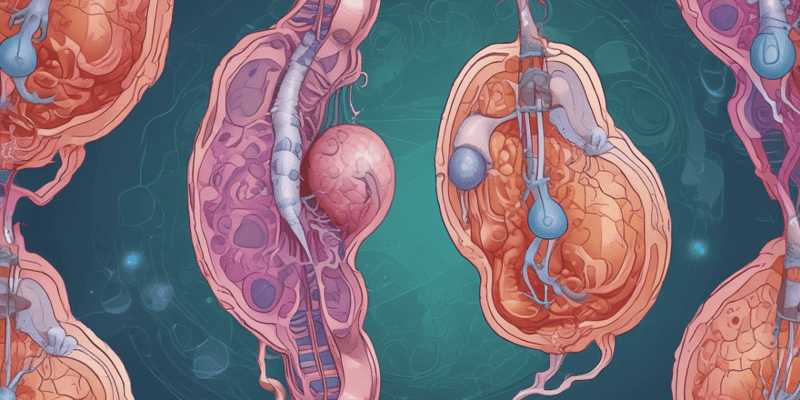Podcast
Questions and Answers
What is embryology primarily concerned with?
What is embryology primarily concerned with?
What characterizes sexual reproduction?
What characterizes sexual reproduction?
Which process produces haploid gametes?
Which process produces haploid gametes?
During which phase of spermatogenesis does the primary sperm cell divide repeatedly?
During which phase of spermatogenesis does the primary sperm cell divide repeatedly?
Signup and view all the answers
Which of the following is an example of asexual reproduction?
Which of the following is an example of asexual reproduction?
Signup and view all the answers
Study Notes
Embryology
- Embryology is the study of early development in living organisms.
- All animals and plants have the capacity to reproduce to ensure survival.
Reproduction
-
Asexual reproduction: A single organism splits, buds, or fragments to create two or more individuals.
- Examples: splitting (paramecium), budding (hydra), fragmentation (yeast).
- Sexual reproduction: Two gametes (male sperm and female egg) fuse to form a fertilized egg (zygote).
Asexual Reproduction Types
- Splitting: The organism divides into two individuals (e.g., paramecium).
- Budding: A small bud grows on the parent organism, then breaks off to become an independent organism (e.g., hydra).
- Fragmentation: The organism breaks into fragments, each of which develops into a new organism (e.g., yeast).
Sexual Reproduction
- It involves the fusion of male and female gametes.
- The sperm's chromosomes (n) combine with the egg's chromosomes (n) to form the zygote's chromosomes (2n).
- The zygote undergoes embryonic development, producing a large number of somatic cells that make up the embryo.
- These somatic cells have a diploid number of chromosomes (2n).
Gametogenesis
- Gametogenesis is the process of producing haploid gametes (sperm and egg).
- The body's somatic cells are diploid (2n), including the gonads (testis and ovary).
- Primordial germ cells (diploid) within the testis and ovary develop into gametes through spermatogenesis and oogenesis.
Spermatogenesis
- The process of sperm production has three phases:
- Multiplication: Primordial germ cells divide mitotically into spermatogonia (2n).
- Growth: Spermatogonia grow into primary spermatocytes (2n), which then undergo meiosis.
- Maturation: Primary spermatocytes divide through meiosis I to form secondary spermatocytes (n). Meiosis II produces spermatids (n), and these mature into spermatozoa (sperm).
Structure of a Sperm (Spermatozoon)
- Head (with acrosome, nucleus).
- Midpiece (with mitochondria).
- Tail (with axoneme).
- Basal body.
Oogenesis
- The process of egg (ovum) production.
- Primordial germ cells in the ovary develop into oocytes (2n).
- Oocytes undergo meiosis and produce mature ova (n).
- The process involves specific phases similar to spermatogenesis.
Testis Structure
- The testis is composed of numerous seminiferous tubules.
- The walls of seminiferous tubules contain a germinal epithelium.
- This epithelium contains primordial germ cells that differentiate into sperm.
Ovary Structure
- The ovary is lined with a germinal epithelium composed of primordial germ cells (2n).
- These cells undergo oogenesis to form mature eggs (ova).
Studying That Suits You
Use AI to generate personalized quizzes and flashcards to suit your learning preferences.
Related Documents
Description
Test your knowledge on embryology and the different types of reproduction. Explore the key concepts of asexual and sexual reproduction, including splitting, budding, and fragmentation. Understand the significance of these processes in the life cycle of organisms.




